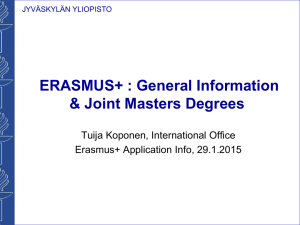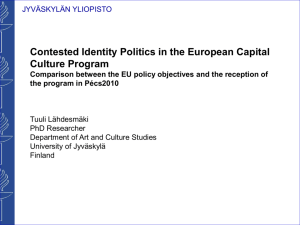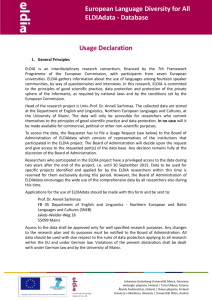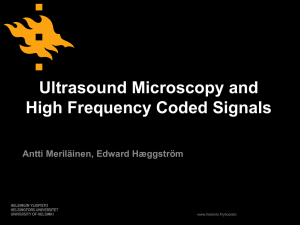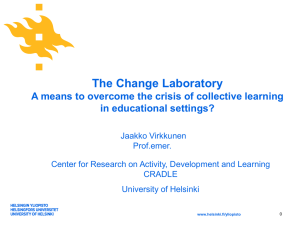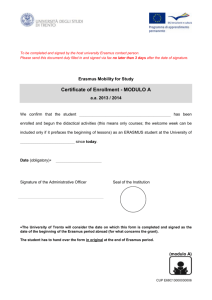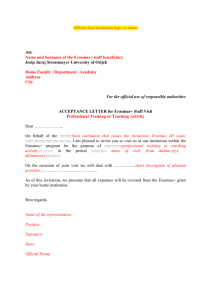Key Action 2: Cooperation for innovation
advertisement
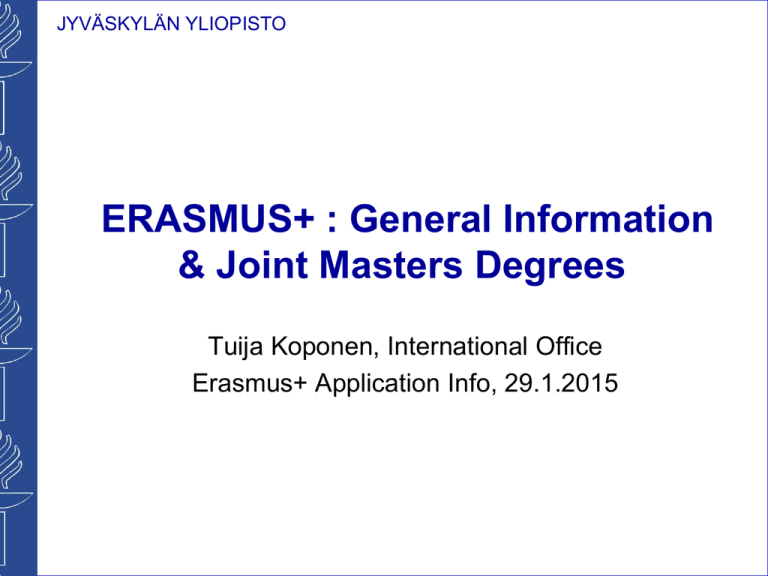
JYVÄSKYLÄN YLIOPISTO ERASMUS+ : General Information & Joint Masters Degrees Tuija Koponen, International Office Erasmus+ Application Info, 29.1.2015 JYVÄSKYLÄN YLIOPISTO Erasmus+ - general information 1/2 Programme period: January 2014 – 2020 Replaced Lifelong learning programme, Youth in Action programme, Erasmus Mundus, Tempus, Alfa, Edulink, EU-USA, EU-Canada, EU-Japan etc. Programme countries (34): can fully take part in all actions – EU Member States – Non-EU countries: Turkey, Iceland, Macedonia, Liechtenstein, Norway Partner countries (over 160): can take part in certain actions, such as, Joint Master Degrees, Capacity Building Projects, Jean Monnet; divided in 13 regions Key words of E+: strategic partnerships, innovations, employability & entrepreneurship JYVÄSKYLÄN YLIOPISTO Erasmus+ - general information 2/2 Strong emphasis on mobility -> 63 % of E+ programme budget! Projects: fewer calls, larger projects, increased funding for projects in later calls for proposals Link to JYU Erasmus Policy Statement in applications: https://www.jyu.fi/yliopistopalvelut/academic-andstudent-services/international-office/staff/policies/eps Erasmus Charter number (29549-LA-1-2014-1-FIE4AKA1-ECHE), and PIC number (999842245) needed in applications At JYU: Int’l Office coordinates Joint Masters Degree –action, Research & Innovation Services all other projects 3 main types of Key Actions Learning mobility of individuals (KA1) Staff mobility, in particular for teachers, lecturers, school leaders and youth workers Mobility for higher education students, vocational education and training students Student loan guarantee Joint Master degrees Mobility for higher education for EU and nonEU beneficiaries Volunteering and youth exchanges Cooperation for innovation and exchange of good practices (KA2) Support for policy reform (KA3) Strategic partnerships between Open method of Coordination education/training or youth organisations and other relevant actors Large scale partnerships between education and training establishments and business: Knowledge Alliances & Sector Skills alliances IT-Platforms including e-Twinning Cooperation with third countries and focus on neighbourhood countries Education and Culture Prospective initiatives EU recognition tools Dissemination & exploitation Policy dialogue with stakeholders, third countries and international organisations Key Action 1 Learning mobility of individuals - Higher EducationOPEN TO THE WORLD 1. 2. Credit mobility: International opening of Erasmus, more mobility of students and staff between EU – non EU in both directions Degree mobility: Joint Master Programmes of excellent quality offered by consortium of EU/non EU universities to attract the very best students worldwide INTRA-EU ONLY 3. Student loan guarantee: to boost degree mobility within Europe Joint Master Degrees (JMDs) are: Highly integrated international master programmes, - selected and supported by the European Commission, - developed and delivered by a consortium of EU and non-EU universities, - that include a mandatory study period in two different countries, - that lead to the award of fully recognised joint or multiple degrees. Financial Support will be awarded for: management of the consortium and the implementation of the JMD for (at least) 3 consecutive intakes - supporting the costs of invited scholars / guest lecturers contributing to the delivery and the excellence of the JMD high level students scholarships awarded to the best master students worldwide. - the Student Scholarship Holders will - Receive a full scholarship covering their tuition, travel and living costs, - For non EU-citizens, be covered by health and accident insurance, - Study (/perform research, /undergo a placement) in two different countries of the consortium, - Be awarded a fully recognised joint or multiple degree after having successfully completed their master -Join the Erasmus + Student and Alumni Association Education and Culture Date: in 12 pts KA2 Cooperation for innovation - Higher Education 1. Strategic Partnerships: more intense cooperation between institutions. 2. Knowledge Alliances: structure partnerships between HEI and businesses 3. Capacity Building in HE for neighbourhood countries, Western Balkans and the rest of the world (Asia, Latin America & Africa) HE Strategic Partnerships Raise HEIs capacity to modernise Knowledge Alliances University-business cooperation for more innovation Support to Neighbouring and WB countries Partnerships between HEIs from EU and Partner Countries for exchange and transfer of experience + Additional MOBILITY STRAND for students and staff Cooperation with Asia, Latin America, Africa, Caribbean and Pacific Limited mobility to achieve projects’ objectives Education and Culture Date: in 12 pts JYVÄSKYLÄN YLIOPISTO Erasmus+ Joint Master Degrees 1/2 Deadline: March 4, 2015 integrated international Master’s degree programme (60 – 120 ECTS) delivered by an international consortium of HEI’s Not for devpt - must be ready to run at the application stage! EC aims to support 350 JMDs during the E+ period Programme must lead to the awarding of joint diploma, double degree or multiple degree Funding for 3 consecutive intakes (4 - 5 yrs) + preparatory year, during which programme is marketed; Funding includes 20 000 euros for preparatory year, 50 000 euros per intake for consortium management, 13 – 20 student scholarships and four invited scholars per intake -> jmd total grant will vary between 2 and 3 million EUR Indicative number of projects to be selected in 2015: 18 Possible continuation funding for successful JMDs (JMD Catalogue): shared funding for up to 3 additional student intakes JYVÄSKYLÄN YLIOPISTO Erasmus+ Joint Master Degrees 2/2 Minimun consortium: HEI’s from at least 3 different programme countries (+ eventual HEI’s from partner country, if relevant) Consortium can include also associated partners, including enterprises, research institutes etc. Jmd must include study periods in at least two of the consortium HEI’s; mandatory study abroad must contain studies leading to at least 30 ECTS Relevance: topics linked to identified needs in European / worldwide context; contribution to excellence & innovation; clear learning outcomes + relevant competences + employability Ensuring programme sustainability is a clear strength! Before considering applying, check current JMD’s! http://eacea.ec.europa.eu/erasmus_mundus/results_compe ndia/selected_projects_action_1_master_courses_en.php JYVÄSKYLÄN YLIOPISTO JYU / national framework for joint degree programmes 1/2 Critical things / national restrictions regarding Joint Master Degrees: Extent of programme – should be 120 ECTS Tuition fees! According to current legislation, Finnish universities cannot charge tuition fees in degree programmes – “Education leading to a university degree… shall be free of charge for the student, unless otherwise provided in this Act.” Joint degree in the sense of awarding one single joint degree certificate / diploma is not necessarily recognized in Finland! JYVÄSKYLÄN YLIOPISTO JYU / national framework for joint degree programmes 2/2 Rectors decision on int’l joint degree programmes https://www.jyu.fi/hallinto/rehtori/intra/en_rp13022013 If the joint degree programme requires changes in the education responsibility of the University of Jyväskylä, the faculty in question is to propose this to the University Board. Important to involve faculty-level head of academic affairs for the planning of jmd’s! Jmd’s must be coherent with JYU degree regulations faculty has to also make a plan on how the jmd implementation costs will be covered when external funding ends faculty will decide, if adjustments are needed to the general student admission criteria of JYU JYU recommends double degrees over joint degrees, because the official status on joint degrees is unestablished JYVÄSKYLÄN YLIOPISTO Erasmus+ Spring 2015 Call for Proposals Research and Innovation Services University of Jyväskylä JYVÄSKYLÄN YLIOPISTO Erasmus+ special features Covering all education, training and youth sectors in a holistic manner, and adding sport Fewer calls and large reduction in number of actions Financial management: greater use of unit costs 40% increase, benefiting all sectors Additional funding from external action instruments to support international dimension of higher education JYVÄSKYLÄN YLIOPISTO 2015 call for proposals covers the following actions of the Erasmus+ programme Key Action 1 (KA1) — Learning mobility of individuals Mobility of individuals in the field of education, training and youth (CIMO) Erasmus Mundus Joint master degrees (EACEA) Large-scale European voluntary service events Key Action 2 (KA2) — Cooperation for innovation and the exchange of good practices Strategic partnerships in the field of education, training and youth (CIMO) Knowledge alliances (EACEA) Sector skills alliances (EACEA) Capacity building in the field of higher education (EACEA) Capacity building in the field of youth (EACEA) JYVÄSKYLÄN YLIOPISTO Spring call for proposals covers the following actions of the Erasmus+ programme Key Action 3 (KA3) — Support for policy reform (CIMO) Structured dialogue: meeting between young people and decision-makers in the field of youth Jean Monnet activities (EACEA) Jean Monnet chairs Jean Monnet modules Jean Monnet centres of excellence Jean Monnet support to institutions and associations Jean Monnet networks Jean Monnet projects Sport (EACEA) Collaborative partnerships in the sport field Not-for-profit European sport events JYVÄSKYLÄN YLIOPISTO Deadlines 2015 Key Action 2 13.00 (12.00 CET) KA203: Strategic Partnerships for higher education 31.3.2015 Knowledge Alliances 26.2.2015 Sector Skills Alliances 26.2.2015 Capacity Building in the field of higher education 10.2.2015 Others 13.00 (12.00 CET) KA347: Structured meetings between young people and decision-makers in the field of youth 10.2., 30.4., and 1.10.2015 Jean Monnet 26.2.2015 Sport: Collaborative Partnerships 14.5.2015 Sport: Not-for-profit European Sport Events 14.5.2015 JYVÄSKYLÄN YLIOPISTO 2015 budget frame The total budget earmarked for this call for proposals is estimated at 1 736,4 M €: – – – – Education and Training: 1536,5 M € Youth: 171,7 M € Jean Monnet: 11,4 M € Sport:16,8 M € JYVÄSKYLÄN YLIOPISTO Programme Guide English Ohjelmaopas Strategic partnerships p.106-122 – online application procedure Knowledge Alliances p.123-131 – Online application procedure Capacity building in the field of higher education p.145-156 – Online application procedure Collaborative partnerships in sports p. 223-227 – Online application procedure Annex I p. 249-296 Application forms JYVÄSKYLÄN YLIOPISTO Key Action 2: Cooperation for innovation 4 types of projects: Strategic Partnerships in the field of education, training and youth; Knowledge Alliances; Sector Skills Alliances; Capacity Building. JYVÄSKYLÄN YLIOPISTO Key Action 2: Cooperation for innovation Projects funded under this Key Action are also likely to have a positive impact on the persons directly or indirectly involved in the activities,such as, for example: increased sense of initiative and entrepreneurship; increased competence in foreign languages; increased level of digital competence; greater understanding and responsiveness to social, linguistic and cultural diversity; improved levels of skills for employability and new business creation (including social entrepreneurship); more active participation in society; more positive attitude towards the European project and the EU values; better understanding and recognition of skills and qualifications in Europe and beyond; improved competences, linked to their professional profiles (teaching, training, youth work, etc.); broader understanding of practices, policies and systems in education, training or youth across countries; greater understanding of interconnections between formal, non-formal education, vocational training, other forms of learning and labour market respectively; increased opportunities for professional development; increased motivation and satisfaction in their daily work. JYVÄSKYLÄN YLIOPISTO Key Action 2: Cooperation for innovation Impact of this Key Action is intended to be: increased quality of education and training and youth work in Europe and beyond: combining higher levels of excellence and attractiveness with increased opportunities for all, including those at disadvantage; education, training and youth systems that are better aligned to the needs of and opportunities offered by the labour market, and closer links to business and the community; improved provision and assessment of basic and transversal skills, particularly entrepreneurship, language competences and digital skills; increased synergies and links and improved transition between the different systems of education, training and youth at national level, with improved use of European reference tools for recognition, validation and transparency of competences and qualifications; Promote the use of learning outcomes when describing and defining qualifications, parts of qualifications and curricula, in support to teaching and learning and in assessment; new and increased inter-regional and cross-border cooperation of public authorities in the fields of education, training and youth; more strategic and integrated use of ICTs and open educational resources (OER) by education, training and youth systems; increased motivation for language learning through innovative teaching methods and better links to practical use of language skills required by the labour market; reinforced interaction between practice, research and policy in each system. JYVÄSKYLÄN YLIOPISTO Key Action 2: Cooperation for innovation Strategic partnerships Aims: address policy objectives, challenges and needs of a specific field (i.e. higher education, vocational education and training (VET), school education, adult education, youth);or address policy objectives, challenges and needs relevant to several fields of education, training and youth. Main activities: Strategic Partnerships aim to support the development, transfer and/or implementation of innovative practices at organisational, local, regional, national or European levels Develop, test, implement new joint curricula, joint study programmes, common modules, intensive programmes Develop project-based cooperation with enterprises to study real-life cases Exploit the potential of Open Educational Resources, collaborative and personalised learning Integrate various study modes (distance, part-time, modular) JYVÄSKYLÄN YLIOPISTO Key Action 2: Cooperation for innovation HE strategic partnerships Characteristics: Flexible projects focused to actual needs and results Projects between different education sectors are possible Innovative and concrete results Activities define the scope of projects Links with the HE modernisation strategy and HEI’s own strategy Objectives include: Quality of education & teaching methods Relevance to employers, employability of graduates Professional development of staff Participation of different sectors and different types of organisations is desirable Minimum partnership: 3 organisations from 3 participating countries. In addition to HEIs e.g. enterprises, public authorities and associations Project duration 2-3 years, funding max. € 450,000 / 3 years De-centralised administration (CIMO) JYVÄSKYLÄN YLIOPISTO Key Action 2: Cooperation for innovation HE strategic partnerships Eligible activities: Blended mobility combining short-term physical mobility (less than 2 months) with virtual mobility; Short-term exchanges of groups of pupils (5 days to 2 months); Intensive Study Programmes (5 days to 2 months); Long-term study mobility of pupils (2 to12 months); Long-term teaching or training assignments (2 to12 months); Long-term mobility of youth workers (2 to12 months); Short-term joint staff training events (5 days to 2 months). Activities of learners as well as long-term activities of staff or youth workers from or to Partner Countries are not eligible. JYVÄSKYLÄN YLIOPISTO Key Action 2: Cooperation for innovation Knowledge alliances -Large-scale cooperation projects between higher education institutions and enterprises Aims: To enhance structured and long-term cooperation between HEI and enterprises to develop innovative ways of producing and sharing knowledge in result-driven projects, particularly in emerging fields Main activities: Delivery of new multidisciplinary curricula responding to business needs Stimulate entrepreneurship and entrepreneurial mind-set of students, academic and company staff Facilitate the exchange, flow and co-creation of knowledge between HEIs and enterprises JYVÄSKYLÄN YLIOPISTO Knowledge Alliance WHAT IS A KNOWLEDGE ALLIANCE? Knowledge Alliances are transnational, structured and result- driven projects, notably between higher education and business. Knowledge Alliances are open to any discipline, sector and to cross-sectoral cooperation. The partners share common goals and work together towards mutually beneficial results and outcomes. Knowledge Alliances are meant to have a short and long-term impact on the wide range of stakeholders involved, at individual, organisational and systemic level. As a general rule, Knowledge Alliances target the cooperation between organisations established in Programme Countries. However, organisations from Partner Countries can be involved in a Knowledge Alliance, as partners (not as applicants), if their participation brings an essential added value to the project. JYVÄSKYLÄN YLIOPISTO Knowledge Alliances: Expectations for projects Innovation in higher education and innovation through higher education in enterprises and their socio-economic environment: innovation is considered as state-of-the-art project-specific and related to the partnerships context and analysed needs. Sustainability of university-business cooperation. A strong and committed partnership with a balanced participation from enterprises and higher education institutions are pivotal for the success of Knowledge Alliances. The role and contribution of each participating organisation and associate partner have to be specific and complementary. Impact going beyond the project's lifetime and beyond the organisations involved in the Alliance. It is expected that partnership and activities persist. Changes in higher education institutions and enterprises have to be measurable. Results and solutions have to be transferable and accessible to a broader audience. JYVÄSKYLÄN YLIOPISTO Knowledge Alliance: Eligible actions Boosting innovation in higher education, business and in the broader socio-economic environment Developing entrepreneurship mind-set and skills Stimulating the flow and exchange of knowledge between higher education and enterprises JYVÄSKYLÄN YLIOPISTO Knowledge Alliance: Eligible actions Boosting innovation in higher education, business and in the broader socio-economic environment: Jointly developing and implementing new learning and teaching methods (like new multidisciplinary curricula, learner-centred and real problem-based teaching and learning); organising continuing educational programmes and activities with and within companies; jointly developing solutions for challenging issues, product and process innovation (students, professors and practitioners together). JYVÄSKYLÄN YLIOPISTO Knowledge Alliance: Eligible actions Developing entrepreneurship mind-set and skills: Creating schemes of transversal skills learning and application throughout higher education programmes developed in cooperation with enterprises aiming at strengthening employability, creativity and new professional paths; Introducing entrepreneurship education in any discipline to provide students, researchers, staff and educators with the knowledge, skills and motivation to engage in entrepreneurial activities in a variety of settings; Opening up new learning opportunities through the practical application of entrepreneurial skills, which can involve and/or lead to the commercialisation of new services, products and prototypes, to the creation of start-ups and spin-offs. JYVÄSKYLÄN YLIOPISTO Knowledge Alliance: Eligible actions Stimulating the flow and exchange of knowledge between higher education and enterprises: Study field related activities in enterprises which are fully embedded in the curriculum, recognised and credited; set-ups to trial and test innovative measures; exchanges of students, researchers, teaching staff and company staff for a limited period; involvement of company staff teaching and research. JYVÄSKYLÄN YLIOPISTO Key Action 2: Cooperation for innovation Knowledge Alliances Large projects max. about 10 projects / year in Europe funding max. € 1 Million Minimum partnership: 6 organisations from 3 participating countries. Among the 6 organisations 2 HEIs and 2 enterprises required All types of organisations may participate and act as applicant Projects may include small-scale mobility if it supports the goals of the project Centralised administration (EACEA) JYVÄSKYLÄN YLIOPISTO Key Action 2: Cooperation for innovation Knowledge Alliances 2014 call (230 applications, 10 projects received funding): Recurrent weaknesses in the applications Rationale-Objectives: Lack of information on how the application is meeting the KA objectives- Ideas and rationale tend to come from the HEIs perspective only Consortium- enterprises: Too few companies actively involved and show solid commitment of setting up an alliance with the purpose of building a long lasting partnership with HEIs Needs analysis: lack of adequate, detailed and convincing explanation State of the art-innovation: state of art rarely ventures beyond a superficial consideration of the lead partner's or consortium's own experience – Lack of information on innovation Impact -sustainability: many proposals underestimated the importance of defining proper impact and sustainability strategy Weak or undefined exploitation of results Sustainability: limited to the reviewing of project results, updating of conclusions, maintenance of the project website JYVÄSKYLÄN YLIOPISTO Key Action 2: Cooperation for innovation Sector Skills Alliances Sector Skills Alliances shall aim at tackling skills gaps, enhancing the responsiveness of initial and continuing VET systems to sectorspecific labour market needs and demand for new skills with regard to one or more occupational profiles. Characteristics modernising VET by adapting to skills needs and integrating work based learning and exploiting its potential to drive economic development and innovation, notably at local and regional levels, increasing the competitiveness of the sectors concerned; strengthening the exchange of knowledge and practice between vocational education and training institution sand the labour market integrating work-based learning; facilitating labour mobility, mutual trust and increased recognition of qualifications at European level within the sectors concerned. JYVÄSKYLÄN YLIOPISTO Key Action 2: Cooperation for innovation Sector Skills Alliances Eligible sector: Commerce Health care Tourism Manufacturing& Engineering Information and communication technology Environmental technologies (Eco-innovation) Cultural and creative sectors JYVÄSKYLÄN YLIOPISTO Key Action 2: Cooperation for innovation Sector Skills Alliances Projects max. about 10 projects / year in Europe Duration 2-3 years funding max. € 1 Million (3 years), 700.000 € (2 years) Minimum partnership: 9 organisations from 3 participating countries – Example: if a Sector Skills Alliance covers 5 countries, it needs 5 public or private entities that provide VET (one per country), 5 public or private entities that have sector-specific expertise and represent orare present in a given sector (one per country), and 5 public or private entities that have a regulatory function for education and training systems (one per country). JYVÄSKYLÄN YLIOPISTO JEAN MONNET activities Aims: To promote excellence in European integration studies in higher education Main activities: Teaching and research (Chairs, Modules & Centres of excellence) Policy debate with academic world and exchanges (networks and projects) Support to institutions or associations activities The creation of a Jean Monnet label Jean Monnet also provides operating grants to specified institutions JYVÄSKYLÄN YLIOPISTO JEAN MONNET activities Jean Monnet Modules must take one of the following forms: Each Module has a minimum duration of 40 teaching hours per academic year. general or introductory courses on European Union issues (in particular at institutions and faculties that do not yet have a highly developed course offering in the field); specialised teaching on European Union developments (in particular at institutions and faculties that do already have a highly developed course offering in the field); summer and intensive courses that are fully recognised. JYVÄSKYLÄN YLIOPISTO JEAN MONNET activities A Jean Monnet Chair can carry out one or more of the following activities: deepen teaching in European Union studies embodied in an official curriculum of a higher education institution; conduct, monitor and supervise research on EU subjects, also for other educational levels such as teacher training and compulsory education; provide in-depth teaching on European Union matters for future professionals in fields which are in increasing demand on the labour market ; encourage, advise and mentor the young generation of teachers and researchers in European Union studies subject areas. JYVÄSKYLÄN YLIOPISTO Erasmus+ contribution to Sport Aims: To tackle cross-border threats to the integrity of sport (doping,match-fixing, violence, intolerance, discrimination) To promote and support good governance in sport and dual career of athletes To promote voluntary activities, social inclusion and equal opportunities, together with the awareness of the importance of health-enhancing physical activity (HEPA), and equal access to sport for all JYVÄSKYLÄN YLIOPISTO Erasmus+ contribution to Sport Collaborative Partnerships European networks in the field of sport Opportunity for cooperation among stakeholders (not existed without EU action) for innovative practices Foster synergies with, and between, local, regional, national and international policies to promote sport and physical activities Focused on grassroots sports JYVÄSKYLÄN YLIOPISTO Erasmus+ contribution to Sport Collaborative Partnerships - Activities Networking among key stakeholders Identification and sharing of good practices Development and implementation of training educational modules Awareness-raising activities on the value of sport and physical activity Collection of data, surveys, consultations Conferences, seminars, meetings events JYVÄSKYLÄN YLIOPISTO Erasmus+ contribution to Sport Collaborative Partnerships Eligibility Criteria Non-profit organisations and public bodies At least 5 organisations from 5 different Programme Countries From 12 to 36 months Max grant: 500,000 EUR JYVÄSKYLÄN YLIOPISTO Evaluation Criteria Key Action 1, Key Action 3, Sport (Not-for-profit European sport events): relevance of the project, quality of the project design and implementation, impact and dissemination. Key Action 2, Jean Monnet, Sport (Collaborative partnerships in the sport field): relevance of the project, quality of the project design and implementation, quality of the project team and the cooperation arrangements, impact and dissemination. JYVÄSKYLÄN YLIOPISTO Application quality – A strong proposal is: Coherent (problems, solutions, target groups, activities, budget, ambitions/resources/competence) Simple (objectives, approach) Evidence based (needs analysis, state of art) Clear (identifying the need for such proposal, the solutions, and the outputs) Rigorous in its planning (which activities, when, for how long, and with what resources) Explicit (do not take for granted any information, if it is not in the application it cannot be taken into account) Circumscribed (a proposal is not about solving the world’s problems, but about solving a specific issue) JYVÄSKYLÄN YLIOPISTO Sähköinen haku Sähköinen hakulomake (Pdf) – ei paperihakemusta Hakemuksen sähköiset liitteet mm.: • Mandaattikirjeet partnereilta (allekirjoitettu ja skannattu) •Declaration of Honour hakijaorganisaatiolta (allekirjoitettu ja skannattu) Huom! Hakulomakkeen liitteet vaihtelevat jonkin verran toiminnon ja sektorin mukaan. Sekä hakija- että partneriorganisaatio tarvitsevat PICkoodin (näkyy hakemuksessa hakija- ja partneritietojen kohdalla) JYVÄSKYLÄN YLIOPISTO Strateginen kumppanuushanke – Kesto 2 tai 3 vuotta – Tuki enintään 450 000 € / 3-v. hanke • Hankkeen tuki määräytyy suunnitellun toiminnan mukaan (max. 150 000 €/vuosi) • Tuet perustuvat laskennallisiin yksikköhintoihin -> voidaan myöntää enintään 10 organisaatiolle (9+1) JYVÄSKYLÄN YLIOPISTO Budjetointi:Strategiset kumppanuudet 1. Hankkeen hallinto ja toteutus (Management and implementation) 2. Partnerikokoukset (Transnational project meetings) 3.Tuotteiden tekeminen (Intellectual outputs) 4.Tilaisuuksien/seminaarien järjestäminen (Multiplier events) 5.Workshopit/koulutustilaisuudet opettajille/opiskelijoille (Transnational learning/teaching/training activities) 6.Muut erityiset kulut hankkeessa (Exceptional costs) (esim. alihankinta) 7.Tuki erityistarpeita omaaville henkilöille (Special needs support) JYVÄSKYLÄN YLIOPISTO Budjetointi:Strategiset kumppanuudet 1. Hankkeen hallinto ja toteutus (Project management and implementation) •Kulut projektin hallinnointiin ja toteutukseen (esim. suunnittelutehtävät, yhteydenpito partnereihin, pienimuotoinen aineiston tuottaminen, taloushallinto) •Online-kokoukset, paikallinen toiminta (esim. kansalliset toiminnot, työskentely opiskelijoiden kanssa: esim. valmistautuminen kv-työpajoihin) •Levitykseen liittyvät perustehtävät (esitteet, webbi, some) –Koordinaattorin hallintotuki 500 €/kk = 6 000 € /vuosi –Partnerin hallintotuki 250 €/kk = 3 000 € /vuosi –Max. 10 toteuttajalle (1+9) = 2 750 €/kk = 33 000 €/ vuosi JYVÄSKYLÄN YLIOPISTO Budjetointi:Strategiset kumppanuudet 2. Partnerikokoukset (Transnational project meetings) •Matkat partnerikokouksiin, summa kattaa myös oleskelu- ja asumiskustannukset, palkkakuluja ei korvata erikseen. •Kokousten ja osallistujien määrä oltava perusteltuja •Perustuvat matkojen pituuksiin, kaksi kategoriaa: –short distance travel: 575 € (100-1999 km) –long distance travel : 760 € (2000 km ) –Alle 100 km:n matkoille ei tukea •Etäisyyksien laskennassa käytetään Distance calculator välimatkalaskinta komission verkkopalvelussa: http://ec.europa.eu/programmes/erasmusplus/tools/distance_en.htm •Max. 23 000 €/ vuosi (eli 40 matkaa, jos kaikki lyhyitä matkoja ”short distance). Matkan tai partnerikokouksen kestoa ei ole rajoitettu. JYVÄSKYLÄN YLIOPISTO Budjetointi:Strategiset kumppanuudet 3. Tuotteiden tekeminen (Intellectual outputs) •Palkkakulut konkreettisten, levitettävien tuotteiden tuottamiseen. HUOM! Ei projektinhallintoon liittyviä tehtäviä tähän! •Käytössä 4 palkkakategoriaa ja neljä maaryhmää. Esim. päiväpalkat suomalaisille organisaatioille: –Manager: 280 €/pv –Researcher/teacher/trainer/youth worker: 214 €/pv –Technician: 162 €/pv –Administrative: 131 €/pv •Palkkio määräytyy henkilön omassa organisaatiossa (ei hankkeessa) olevan tehtävän mukaan. –Huom. manager -palkkiota voidaan budjetoida vain johtotason henkilöille. Käytännössä suurin osa budjetoidaan ”teacher/researcher” tai ”technician” kategorioihin. JYVÄSKYLÄN YLIOPISTO Budjetointi:Strategiset kumppanuudet 4. Tilaisuuksien/seminaarien järjestäminen (Multiplier events) •Tapahtumat tarkoitettu intellectual outputs –kohdassa rahoitettujen tuotosten/tuotteiden levitykseen ja kokemusten jakamiseen. •Tarkoitettu partneriryhmän ulkopuolisille kohderyhmille/käyttäjille. •Voivat olla kansainvälisiä tai kansallisia •Tuki lasketaan osallistujamäärän mukaan, mutta tuki on tarkoitettu tilaisuuden järjestämiskuluihin, esim. tilavuokrat, tarjoilut, materiaalit, puhujien matka- ja majoituskulut •Partnereiden matkat tällaisiin tilaisuuksiin budjetoidaan ”transnational project meetings” -kategoriaan. •Huom. Jos tilaisuus järjestetään ainoastaan verkossa, silloin verkkoseminaarin järjestelykustannukset katetaan ”Project management” -kululuokasta. Tuki määräytyy osallistujamäärän mukaan –Tilaisuuden järjestämismaasta olevat osallistujat: 100 €/hlö –Osallistujat muista maista: 200 €/hlö Tuki enintään 30 000 €/hanke, riippumatta hankkeen kestosta tai partnerimäärästä. JYVÄSKYLÄN YLIOPISTO Budjetointi:Strategiset kumppanuudet 5. Liikkuvuustoiminnot 1/4 (Transnational learning/teaching/training activities) •Toiminnon oltava oleellinen hankkeen päämäärien saavuttamiseksi •Osallistujina voivat olla opettajat, henkilökunta ja/tai opiskelijat •HUOM! Ei saa järjestää ohjelmaan osallistuvien maiden ulkopuolella! •2 kategoriaa: Lyhytkestoiset: 5-60 päivää Pitkäkestoiset: 61 päivää – 12 kk •3 eri kululuokkaa / matkustaja Matkakulut (Travel) Asumis- ja oleskelukulut (Individual support) Kielivalmennus (Linguistic support) vain pitkäkestoisessa (61 kk) liikkuvuudessa perustelluista syistä JYVÄSKYLÄN YLIOPISTO Budjetointi:Strategiset kumppanuudet 5. Liikkuvuustoiminnot 1/4 (Transnational learning/teaching/training activities) A.Matkakulut, perustuvat matkojen pituuksiin short distance travel 275 € (100-1999 km) long distance travel 360 € (2000 km ) Alle 100 km:n matkoille ei tukea B.Asumis- ja oleskelukustannukset kohdemaan mukaan Short term mobility 5–60 päivää: opettajille (70–100 € kestosta riippuen) opiskelijoille (40–55 € kestosta riippuen) Long term mobility 61 pv–12 kk: kuukausiapuraha, ks. taulukko (Table C) Erasmus+ Progamme Guide, s. 108 C.Kielivalmennustuki (long term): 150 €/hlö JYVÄSKYLÄN YLIOPISTO Budjetointi:Strategiset kumppanuudet 6. Muut erityiset kulut hankkeessa (Exceptional costs) •Työsuunnitelmassa ja budjettitaulukossa perustellut alihankinnat: –Esim. ulkoinen arvioija tai muu sellainen (asiantuntija)työ, jota ole saatavilla hankkeessa mukana olevilta organisaatioilta. –perustelluista syistä laitteet, ei kuitenkaan perusinfraa tai partneriorganisaation tavanomaisia laitteita. –75 % todellisista kustannuksista, max 50 000 € (Grant requested = pyydetty summa eli 75 % hankintahinnasta, huomioi ALV:n vaikutus) 7.Tuki erityistarpeita omaaville henkilöille (Special needs support) •Erityistä tukea tarvitsevat henkilöt voivat saada lisätukea •100 % todellisista kustannuksista •Raportointi todellisten kulujen mukaan. JYVÄSKYLÄN YLIOPISTO Electronic Submission (NOT YET OPENED FOR MOST ACTIONS) Register in the Participant portal https://eacea.ec.europa.eu/PPMT/ Create individual ECAS account (if you have participated in FP7 programme, you have already an account) You will need our university’s PIC code (ask from research and innovation services) Download of e-Form Save it on your local computer JYVÄSKYLÄN YLIOPISTO Submitting applications CIMO’s guideline http://www.cimo.fi/ohjelmat/erasmusplus/hakuprosessi Model forms: http://ec.europa.eu/programmes/erasmusplus/index_en.htm https://eacea.ec.europa.eu/erasmusplus/funding/knowledge-alliances-sector-skillsalliances-eacs1113_en Guidelines were supposed to be updated by mid February! JYVÄSKYLÄN YLIOPISTO Electronic Submission (NOT YET OPENED FOR MOST ACTIONS) Register in the Participant portal https://eacea.ec.europa.eu/PPMT/ Create individual ECAS account (if you have participated in FP7 programme, you have already an account) You will need our university’s PIC code (ask from research and innovation services) Download of e-Form Save it on your local computer JYVÄSKYLÄN YLIOPISTO Submitting applications CIMO’s guideline http://www.cimo.fi/ohjelmat/erasmusplus/hakuprosessi Model forms: http://ec.europa.eu/programmes/erasmusplus/index_en.htm https://eacea.ec.europa.eu/erasmusplus/funding/knowledge-alliances-sector-skillsalliances-eacs1113_en JYVÄSKYLÄN YLIOPISTO Previous Projects of JYU (application form: Background and Experience) Open Educational Ideas and Innovations (OEI2) – towards open idea and innovation sharing for learning, education and training 539990-LLP-1-2013-1-FI-ERASMUS-EQMC JYU koord. Jan Pawlowski Peer Assessment of Student Centred Learning in Higher Education Institutions in Europe 539843-LLP-1-2013-1-BE-ERASMUS-ESIN Coordinator: The National Unions of Students in Europe 539512-LLP-1-2013-1-DE-COMENIUS-CAM Implementation Strategies for Innovations in Teachers´ Professional Development Coordinator University of Cologne 543848-TEMPUS-1-2013-1- RS-TEMPUS-JPCR Master in Educational Leadership Coordinator: University of Kragujevac JYVÄSKYLÄN YLIOPISTO Pedagogical Action for a European Dimension in Educators' Induction Approaches 526885-LLP-1-2012-1-TR-COMENIUS-CMP COORDINATOR: Gazi Universitesi European MSc in Advanced Rehabilitation Technologies 527790-LLP-1-2012-1-UK-ERASMUS-EMCR COORDINATOR: University of Southampton Network for Innovation in Career Counselling & Guidance in Europe 527992-LLP-1-2012-1-DE-ERASMUS-ENW COORDINATOR: Reframing - Organization and Communication Development JYVÄSKYLÄN YLIOPISTO The Challenges of the Multilingual and Multicultural Learning Space in the International University 526646-LLP-1-2012-1-DK-ERASMUS-ENW COORDINATOR: Aarhus University ECVET and ECTS - Growing Links in European Education 527205-LLP-1-2012-1-DE-LEONARDO-LMP COORDINATOR: Hochschule für angewandte Wissenschaften München Digital Literacy Instructor 527536-LLP-1-2012-1-NL-GRUNDTVIG-GMP COORDINATOR: Stichting Katholieke Universiteit FOUNDATION OF STUDY PROGRAM FOR INCLUSIVE EDUCATION IN MONTENEGRO 530766-TEMPUS-1-2012-1-METEMPUS-SMHES Coordinator: University of Montenegro JYVÄSKYLÄN YLIOPISTO Early Change: Promoting the Professional Development of Early Childhood Educators 517999-LLP-1-2011-1-GR-COMENIUS-CMP COORDINATOR: Alexander Technological Educational Institute of Thessaloniki Modularising multilingual and multicultural academic communication competence for BA and MA level 517575-LLP-1-2011-1-CH-ERASMUS-EMCR COORDINATOR: Université de Lausanne / University of Lausanne TITLE: Sharing Practice in Enhancing and Assuring Quality 517706-LLP-1-2011-1-UK-ERASMUS-EMGR COORDINATOR: LLAS Subject Centre, University of Southampton JYVÄSKYLÄN YLIOPISTO Children’s Identity and Citizenship in Europe 517961-LLP-1-2011-1-UK-ERASMUS-ENW COORDINATOR : London Metropolitan University Aquatnet - Promoting innovation and a European dimension through Lifelong learning in the field of Aquaculture, Fisheries and Aquatic Resources Management 518700-LLP-1-2011-1-UK-ERASMUS-ENW COORDINATOR: University of Stirling A Science-Based Tool for Training Fluency in Literacy for Teachers and Learners 510127-LLP-1-2010-1-FI-COMENIUS-CMP COORDINATOR: University of Jyväskylä Ulla Richardson AC JYVÄSKYLÄN YLIOPISTO NETWORK ON CREATIVITY IN PRE-SCHOOL EDUCATION 510473-LLP-1-2010-1-IT-COMENIUS-CNW COORDINATOR: Sweden Emilia Romagna Network European Diploma in Intercultural Competence 504637-LLP-1-2009-1-FI-ERASMUS-ECDSP COORDINATOR: University of Helsinki Teacher Virtual Campus: Research, Practice, Apply 502102-LLP-1-2009-1-LT-ERASMUS-EVC COORDINATOR Vytauto Didžiojo universitetas (Vytautas Magnus University) University Network for Innovation in Guidance 155976-LLP-1-2009-1-DE-ERASMUS-ENWA COORDINATOR: RUPRECHT-KARLS- UNIVERSITY OF HEIDELBERG
